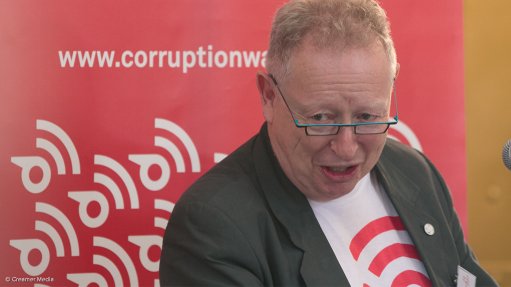
Corruption Watch Director David Lewis
Photo by: Duane Daws
South Africans are increasingly intolerant of corruption and the abuse of power by those in leadership positions and are more willing to hold them to account.
This was according to anticorruption organisation Corruption Watch’s 2016 Annual Corruption Report.
The report reviews the past five years of the public experiences of corruption, as reported to Corruption Watch and celebrates the close to 15 000 whistle-blowers who have chosen to take action.
Corruption Watch executive director David Lewis said 2016 was the year in which South Africans decisively and publicly rejected corruption.
“From ordinary voters and community members through to leading public officials and Cabinet Ministers, there was a groundswell of opposition to corruption and its perpetrators. But the fight is not over by any means. The future of our country rests on our ability to maintain and intensify the pressure exerted in 2016,” he said.
A total of 4 391 reports of corruption were received, a substantial increase on the previous years since the organisation was launched in 2012. The increase amounted to an average of 11 reports a day, compared with seven in 2015.
The report shows that corruption hotspots, as demonstrated by the complaints received, included schools at 16% of cases reported, road traffic corruption incidents at 7% of the reports, and licensing and immigration-related matters at 6%.
“The whistleblowing reports that we receive are the source of our legitimacy. They enabled us to speak with the voice of the public. They provided us with the ability to identify patterns and hotspots of corruption, to target campaigns, to investigate and to litigate. They constitute the evidence that we present to those in authority. In 2017 our primary objective is to significantly raise the volume of reports that we receive,” commented Lewis.
As part of its efforts to protect whistle-blowers in South Africa, Corruption Watch has given its input to the Protected Disclosures Act. Earlier this year the organisation was invited to provide public commentary on the Protected Disclosures Amendment Bill by the Select Committee on Justice and Correctional Services, and made its submissions to Parliament on February 15, 2017.
The focus for Corruption Watch in 2017/18 is to continue to engage the public around issues such as the National Anti-Corruption Strategy, as well as the school governing body elections in 2018.
The organisation is also committed to extending its reach beyond urban areas and is seeking to provide access for those in rural communities to report corruption in their provinces.
Corruption Watch said the data created the opportunity to target corruption in specific sectors, as reports about ongoing corruption in schools, and the departments of Home Affairs and Housing continued to come in.
According to the report the most prevalent types of corruption reported in 2016 centre on the abuse of power, followed by bribery and procurement corruption.
With this information Corruption Watch has been successful in launching campaigns relying on increased public participation and mobilization, such as project Lokisa, which focuses on exposing corruption in the immigration sector, and Bua Mzansi, which encourages the public to participate in the appointment of public officials like the Public Protector.
To access the report click here.